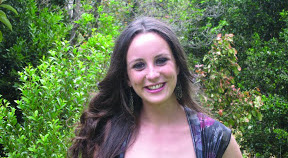 |
Dalit Anstey discusses interfaith initiatives, the challenges and best aspects of high school, and thoughts on the community.
What are some of the goals of the Herzlia High School Student Council 2010/2011?
At the beginning of our term of office, we had a fantastic council camp, where we drafted our goals for the year. These include creating a sense of unity within Herzlia; encouraging ruach and school pride; strengthening inter-Herzlia relationships and the relationship with the UHS; and fulfilling and representing the needs of the matrics. These goals have been accomplished in various projects: A matric unity Shabbat dinner using the fan walk concept from shul to shul; termly SRC braais, the grade 9 pre-orientation activity; and the ‘grade liaison project’ that encourages feedback from the school to the SRC.
We also aim to broaden social horizons, including interaction with different cultures, religions and schools. We want to acknowledge our social responsibility and get involved in community service. On 28 April we are hosting an interfaith evening at the high school, where faith-based schools will engage in interfaith dialogue. The event will host religious leaders on a panel and include interactive workshops. The need for this event has arisen from Herzlians feeling isolated from other religions. We invite your participation, so please contact us.
What do you think are some of the challenges facing high school students?
Sometimes Herzlians feel alienated from the rest of South Africa and get a bit of a shock after school. Projects like our interfaith evening will combat this. Other challenges are finding a balance within Jewish education that retains Jewish identity and also builds a South African identity; and how students will approach their Zionist identity after school. There are also challenges posed to students applying to UCT, and their admissions policy.
What do you think are the best aspects of the high school?
The fact that Herzlia is an inclusive school makes it unique, and it has fantastic remedial facilities. Herzlia’s open door policy encourages pupils to be proactive and feel empowered. Individual identity is embraced, and there are many activities on offer. What you put in, you will get out! Ultimately, the school is a community.
The Pesach story reminds us to reach out to others. How do you think we can make this message relevant today?
There are many outreach committees at Herzlia that the community can be proud of. Students put tremendous amounts of time and effort into these initiatives. There are also many teachers whose motivation inspires pupils. The committees do different types of gemilut chassadim that aim to involve students in the world and struggles around them. The SRC also recognises our role to lead by example and have chosen to work with a crèche in Khayelitsha, called Ilitha, this year.
What are your thoughts about the Cape Town Jewish community? What makes it unique and what do you think are some of its challenges?
The community is unique as a result of our heritage and experience as South Africans of reconciliation. One of the major challenges we face is that of unity. As Jews we are encouraged to question and be proud of who we are. The community is made up of different streams of Judaism, which is reflected as a microcosm in Herzlia. Sometimes in the wider community we struggle over when we need to be united and when we are ‘allowed’ to be different. Sometimes, what we lack is trust within each other. We should use the example of the youth, who in Herzlia are able to unite despite differences.
Another challenge is the question of how the community will maintain a community-driven school in postapartheid South Africa. It is becoming vital for the community (and Herzlia) to become more involved in new initiatives in South Africa: Interfaith dialogue, cultural programmes and political gatherings. It’s important not to base our relationships solely on reaching out but also as equals, to empower people as well as to learn from them.
We also need to deal with how to combat and decide what is anti-Zionism or antisemitism. As a community it is vital for us to be proactive and not always on the defence.
It is important for the older generation to listen to and give a space to the youth, otherwise there will be a gap between generations; to make the youth feel valued; and to invest in youth and recognise potential. We must stop marginalising people as we will chase them away. We should accept challenges with open arms, as it is important to evaluate our goals.
There are some amazing youth movements in the community that develop the leadership of the Jewish world. We need to recognise these movements and give them credit — and maybe even gain skills from them.
Because Herzlia is a community school the community should know about what’s happening in the school. I see potential in an exercise where community leadership could meet school leadership, find commonalities and join together in terms of support and expertise.
What would you like to say to parents of high school learners?
Encourage your children to get involved in the school and make the most of every opportunity — there is something for everyone! They can get involved in existing activities or introduce new things. School offers a sample of the real world and is a good place to start. Anything else you would like to add: Feel free to contact me about the SRC Interfaith Evening or anything else!











